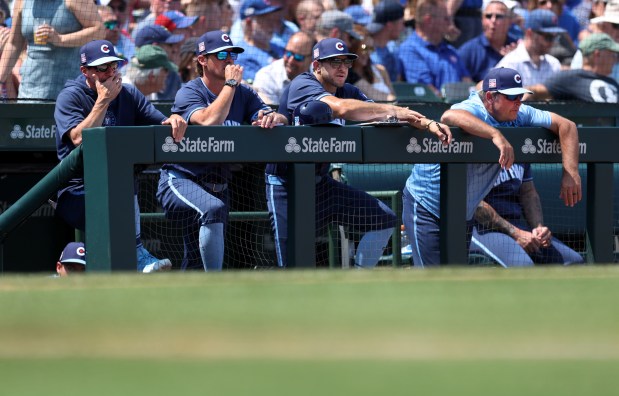The Chicago Cubs were in an awful 8-31 rut in September 1999 when they decided to shake things up on and off the field.
Fred Sandke, a veteran Wrigley Field usher in his early 70s who ran the only ballpark elevator at the time, was moved from a job he’d held for four years to a new post in the family section in left field. Asked about the switch, Sandke lamented that his bosses told him “I needed some fresh air.”
Sandke was an innocent bystander caught up in management’s endless search for answers during a miserable season. The move didn’t help the ’99 Cubs, who finished last in the National League Central with 95 losses and fired manager Jim Riggleman on the final day of the season.
Sandke’s saga came to mind Friday at Wrigley Field as Cubs right fielder Seiya Suzuki entered the second half of the season without his longtime interpreter, Toy Matsushita, who was quietly let go during the All-Star break. Two other employees — Shota Imanaga’s interpreter, Edwin Stanberry, and video coordinator and Pacific Rim liaison Nao Masamoto — will share the job the rest of the year.
In the short term, the change of interpreters proved meaningless. Suzuki was 0-for-3 and struck out with two on to end Friday’s 5-2 loss to the Arizona Diamondbacks on a gorgeous afternoon.
But perhaps the Cubs felt in the long term a breath of fresh air was necessary for Suzuki, whom they need to thrive in the second half if they intend on playing in the postseason, a long-shot scenario.
With Cody Bellinger rehabbing from a fractured left middle finger, Suzuki’s importance will be magnified during the stretch run, especially with a lineup that looks half-empty.
The bottom five hitters in the order Friday all entered the game hitting below .220: Christopher Morel (.202), Dansby Swanson (.212), Miles Mastrobuoni (.197),Tomas Nido (.202) and Pete Crow-Armstrong (.203).
It’s not a recipe for success, and the lack of offense was noticeable again when the Cubs finished with eight hits.
Suzuki, who had two walks, hasn’t had much to talk about this season. He hasn’t been bad, but he also hasn’t been the hitter the Cubs thought he would be, much less the one who helped carry them back from the dead and into the wild-card race last summer before they ultimately succumbed in September.
Manager Craig Counsell didn’t have much to say about the change of interpreters and gave no reason for it.
“Essentially we just made a decision moving forward that we could be in a good spot without Toy,” Counsell said. “And we felt we have a pretty good support system around Seiya with some other people. … Nothing will really change.”
Counsell said the decision had nothing to do with trying to get more out of Suzuki.
Coincidentally, the Cubs released a video Thursday that featured an actor playing Suzuki as a boy. The video promoted their season-opening trip to Japan next year to play the Los Angeles Dodgers and told a story of two young Japanese boys watching the Cubs play the New York Mets in 2000 in Tokyo.
Both are seen on a split screen watching on TV with their families. Then it’s revealed that one is named Shota and the other Seiya.
“Someday,” they say together from their separate houses, as former Cub Mark Grace rounds the bases after hitting a home run.
Of course, the idea that Suzuki and Imanaga grew up in Japan dreaming of playing for the Cubs is far-fetched, but no one can blame the team for trying to create a myth. The organization spent decades denying there was such a thing as “the Billy Goat curse,” then bragged about breaking the curse after finally winning in 2016.
Eight years later, they’re looking to return to relevance in a season that has been hugely disappointing so far. Friday was a chance to put the past behind and start again.
“By nature it’s a fresh start, absolutely,” Counsell said. “For everybody, there’s just a mental break. That’s important. But, look, you have a game today and then we’re back in the schedule.”
Thoughts of last year’s second-half turnaround were fresh in Cubs fans’ heads as a packed house of 40,691 stood and cheered Suzuki when he came to the plate in the eighth with two on, no outs and the Cubs trailing 5-1.
Suzuki walked to load the bases, but the Cubs could muster only one run in the inning, which ended on Mastrobuoni’s bases-loaded groundout.
Suzuki came up one final time in the ninth with two on and two outs but went down swinging as Diamondbacks closer Paul Sewald sealed the win.
The Cubs fell to 47-52, and the second half was off and crawling.
The trade deadline is getting closer and closer, and which direction the Cubs are headed is anyone’s guess. Maybe some veterans will be shopped more actively as the deadline approaches and the team remains under .500.
Everyone could use a breath of fresh air.



